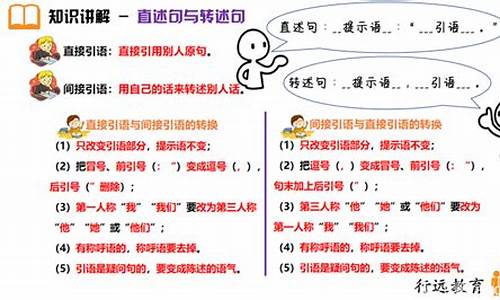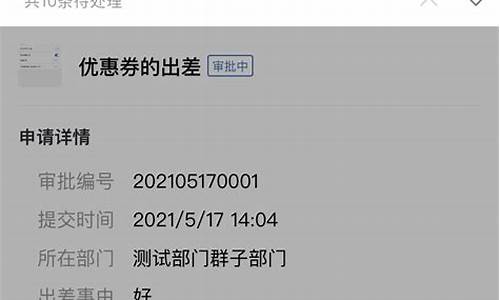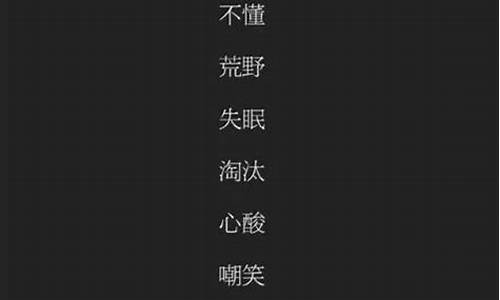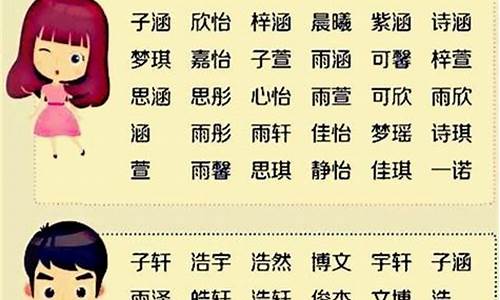把直接引述句改为间接句_句子的转换直接引述改成间接引述的方法
1.英语直接引语改间接引语的方法
2.直接引语转换为间接引语的技巧
3.英语直接引语和间接引语的转换方法

直接引语的一般现在时→间接引语的一般过去时;
直接引语的一般将来时→间接引语的过去将来时;
直接引语的一般过去时→间接引语的过去完成时;
直接引语的现在进行时→间接引语的过去进行时;
直接引语的现在完成时→间接引语的过去完成时;
直接引语的过去完成时→间接引语的过去完成时
扩展资料
1.直接引语为陈述句时如何变为间接引语
方法是:将直接引语变为由that引导的宾语从句跟在引述动词之后(that也可省略):
“I don’t love her.” he says. 他说:“我不爱她。”
→He says that he doesn’t love her. 他说他不爱她。
注意
(1)若引述动词用的是say to sb,则通常改为tell sb:
“It’s a secret.” he said to me. 他对我说:“这是秘密。”
→He told me that it was a secret. 他对我说那是秘密。
(2)若直接引语是两个并列的陈述句,要注意在第二个宾语从句前加连词that:
He says, “I like singing and I want to be a singer.” 他说:“我喜欢唱歌,我想当歌手。”
→He says that he likes singing and that he wanted to be a singer. 他说他喜欢唱歌,想当歌手。
在此种情况下,引导第一个宾语从句的.that有时可以省略,但引导第二个宾语从句的that通常不省略,以免误解。(from .yygrammar)
2.直接引语为一般疑问句时如何变为间接引语
方法是:将直接引语变为由if或whether引导的宾语从句跟在引述动词之后:
“Are you ill?” he asked. 他问:“你病了吗?”
→He asked if [whether] I was ill. 他问我是否病了。
注意
(1)改为宾语从句的间接引语要用陈述句词序。
(2)若直接引语引述动词为say,改成间接引语应将其改为ask等。
3.直接引语为特殊疑问句时如何变为间接引语
方法是:将直接引语变为由“疑问词”引导的宾语从句跟在引述动词之后:
He asked, “When did she lee?” 他问:“她什么时候离开的?”
→He asked when she had left. 他问她什么时候离开的。
英语直接引语改间接引语的方法
直接引语改成间接引语
一、 什么是直接引语和间接引语.
“直接引语”是指在文中直接引用别人的原话.而“间接引语”是用自己的话转述别人的意思,或引用自己说过的话.在语文写作中,我们经常会遇到将直接引语与间接引语进行转换的情况.
二、直接引语怎样转换为间接引语.
直接引语转换为间接引语时,不管提示语在哪里(前、后、中),都应该将提示语写道前面来.
例:小明说:“下雨了,我今天不到奶奶家去.”
改为:小明说下雨了,他今天不到奶奶家去.
“下雨了,”小明说,“我今天不到奶奶家去.”
改为:小明说下雨了,他今天不到奶奶家去.
“下雨了,我今天不到奶奶家去.”小明说.
改为:小明说下雨了,他今天不到奶奶家去.
1、标点符号的转换:直接引语转换成间接引语,标点符号遵循“两去两改”的原则.去掉冒号和引号.感叹号、问号都改成句号.
例:他笑着问小姑娘:“小朋友,拾到什么好东西?”
改为:他笑着问小姑娘拾到什么好东西.
2、人称的转换:a、直接引语中出现了第三人称,改写为间接引语时,人称代词不用改变.直接将句子整理通顺即可.
例:妈妈说:“小明到外婆家去了.”
改为:妈妈说小明到外婆家去了.
b、直接引语中出现了第一人称的时候,改写为间接引语时,要将第一人称改为第三人称.
例:小云说:“我不玩了.”
改为:小云说他不玩了.
C、直接引语中出现的是第二人称的时候,要将句中的第二人称改为第一人称.
例:妈妈这样说:“是啊,现在你是强者,是勇敢的人啦!”
改为:妈妈说我现在是强者,是勇敢的人了.
d、直接引语中同时出现了不同人称的时候,就应该根据以上的各项进行改写.
例:老师十分和蔼地对她说:“我们为该剧设计了一个旁白,你的口齿清楚,音色柔美,希望你担任这个叙述者的角色.”
改为:老师十分和蔼地对她说他们为该剧设计了一个旁白,她的口齿清楚,音色柔美,希望她担任这个叙述者的角色.
拓展:怎样辨别:
1、直接引语如果表示客观真理,变间接引语时,时态不变。
2、直接引语若有明确的表示时间的词语,变间接引语时,时态不变。
3、若直接引语中含有could,must,should等情态动词,变间接引语时,时态不变。
4、直接引述别人的原话,叫直接引语。
5、用自己的话转述别人的话,叫间接引语。
编辑于 2017-11-04
TA的回答是否帮助到你了?
能够帮助到你是知道答主们最快乐的事啦!
有帮助,为TA点赞
无帮助,看其他答案
查看全部9个回答
二年级必读课外书_点击进入_随时随地
根据文中提到的小学为您推荐
淘宝超值二年级必读课外书,优享品质,惊喜价格,商品齐全,淘你满意!上淘宝,惊喜随处可淘!
淘宝热卖广告
二年级阅读书目推荐
值得一看的书籍推荐相关信息推荐
正品低价_品质保障_极速发货_轻松购物_你想知道的,这里全都有!更多精彩内容,尽在拼多多
lp.pinduoduo广告
更多专家
小学语文里,怎么把直接引语改成间接引语
专家1对1在线解答问题
5分钟内响应 | 万名专业答主
马上提问
最美的花火 咨询一个初等教育问题,并发表了好评
lanqiuwangzi 咨询一个初等教育问题,并发表了好评
garlic 咨询一个初等教育问题,并发表了好评
188****8493 咨询一个初等教育问题,并发表了好评
篮球大图 咨询一个初等教育问题,并发表了好评
动物乐园 咨询一个初等教育问题,并发表了好评
AKA 咨询一个初等教育问题,并发表了好评
2条评论
月光y33
你不觉得你的第四条和你的第三条都矛盾了
查看全部2条评论
— 你看完啦,以下内容更有趣 —
淘宝语文书6年级千万商品,品类齐全,千万别错过!
淘宝超值语文书6年级,优享品质,惊喜价格,商品齐全,淘你满意!上淘宝,惊喜随处可淘!
广告2021-10-30
小学语文里,怎么把直接引语改成间接引语
修改人称,把第一人称改为第二或第三人称
91浏览2017-10-04
小学语文如何把直接引语改成间接引语
小学语文复习---直接引语改写成间接引语
直述句改为转述句,从其外在形式上讲,有两个显著的特征,那就是标点符号的变化和代词(还有个别趋向动词情况)的变化。标点符号的变化比较简单,就是去掉引号,冒号变为逗号。而代词的变化,就是一个有特殊语境限定因素而限制了的相应变化,是比较复杂的。
一、把直接引语改写成间接引语。
12赞·907浏览
小学语文中的直接引语改为间接引语与改为第三人称转述两者有什么不同呢?
那是因为句子的需要而定的,直接的表示具体的环境下的语言;而转述而是向别人转达。
79赞·9,566浏览
小学语文里,怎么把直接引语改成间接引语 — 找答案,就来「问一问」
6250位专家解答
5分钟内响应 | 万名专业答主
语文直接引语变间接引语练习题,小学的,稍微要难一点
小明说:“下雨了,我今天不到奶奶家去。”
答案:小明说下雨了,他今天不到奶奶家去。
他笑着问小姑娘:“小朋友,拾到什么好东西?”
答案:他笑着问小姑娘拾到什么好东西。
4赞·2,790浏览
小学六年级语文句型转换题
陈述
1、那电线上停着的几个小黑点,不正是伶俐可爱的小燕子吗
改:
2、不耕耘怎么有收获?不学习怎会有知识?
改:
3、这位小姑娘天真美好的心灵,不正像一朵含苞欲放的花蕾吗?
改:
4、难道我们能随意砍伐树木,破坏绿化吗?
改:
5、字典不正是我无声的朋友和老师吗?
改:
6、你不为我们的祖国有这样的英雄而感到自豪吗?
改:
7、这一朵朵绚丽的鲜花不正是园艺工人辛勤劳动的结晶吗?
改:
8、这些设想即使能够实现,又有多少人能够去居住呢?
改:
9、看到那数不尽的饿青松白桦,谁能不向四面八方望一望呢?
改:
10、人与山的关系日益密切,怎能不使我们感到亲切与舒服呢?
改:
11、海边上不是还泛着白色的浪花吗?
改:
12、我们遇到困难,怎么能退缩呢?
改:
13、说出的话难道可以不算数?
改:
14、难道这不是祖国母亲对我的期望吗?
改:
15、不是自家人,难道就不该互相关心吗?
改:
16、不劳动,连棵花也弄不活,这难道不是真理吗?
改:
17、当农民,难道就不需要文化知识了吗?
改:
18、 十万支箭,三天怎么造得成?
改:
19、 都是你自己找的,我怎么帮得了你的忙?
改:
20、 那浪花所奏的不正是一首欢乐的歌吗?
改:
21、 我们怎能忘记老师的谆谆教导?
双重否定
他每个夜晚都是这样工作的。
改:
同窗六载的情谊,我记在心中。
改:
妈妈知道了我的那件事。
改:
舞台对我有着神奇的吸引力.
直接引语转换为间接引语的技巧
引述别人的话时,一般用两种方式:一是引用别人的原话,把它放在引号内,称为直接引语;二是用自己的话加以转述,被转述的话不放在引号内,称为间接引语.间接引语在大多数情况下是一个宾语从句.直接引语变成间接引语时,要注意以下几点:人称变化、时态变化、宾语从句要用陈述句语序等.
1.直接引语是陈述句,变成间接引语时,由连词that 引导.例如:
She said,“I am very hy to be with you.” →She said (that) she was very hy to be with me.
He said,“I will choose a book for my students.” →He said(that)he would choose a book for his students.
2.直接引语是一般疑问句时,变成间接引语,由连词whether或if 引导.例如:
He asked me,“Do you like watching TV?”→He asked me if/whether I liked watching TV.
He asked,“Are you sure your mother will come?”→He asked me whether / if I was sure my mother would come.
注意:大多数情况下,if和whether 在引导宾语从句时可以互换,但后紧跟or not时,一般只用whether.例如:
She asked me whether or not he could do the work./ She asked me whether he could do the work or not.
3.直接引语是特殊疑问句,变成间接引语时,由相应的连接词who,whom,what,whose,how,when,why,where 等引导.例如:
He asked:“Where are you to get off,John?” →He asked John where he was to get off.
My sister asked me,“How do you like the play?”→My sister asked me how I liked the play.
Tom asked me,“Who is the boy over there?”→Tom asked me,“Who was the boy over there?”
4.直接引语是祈使句,其间接引语由主语+动词ask(委婉语气),tell(一般语气),order (命令语气)或warn,advise等+复合宾语(名/代词+动词不定式)构成.如:
He said,“Please come here again tomorrow.”→He asked me to go there again the next day.
“Be careful with the dog.”→He warned me to be careful with the dog.
5.直接引语变间接引语时,如果引述动词为过去式,需注意时态的变化:如:
1) Betty said,“Lingling is singing in the classroom now.” 现在进行时→
Betty said Lingling was singing in the class room then.-过去进行时
2) He said,“I will go to London next week.” 一般将来时→
He said he would go to London next week.过去将来时
3) My mother said,“I he already cleaned the house.” 现在完成时→
My mother said she had already cleaned the house.过去完成时
注意:
1.直接引语是客观事实、普遍真理等,主句尽管是过去时态,变成间接引语时,时态仍然用一般现在时态.例如:
They told their son,“The earth goes round the sun.”→They told their son that the earth goes round the sun.
2.直接引语变间接引语时,指示代词、时间状语、地点状语、动词等要作相应的变化.如:this→that,these→those,now→then,today→that day,yesterday→the day before,last year→the year before,ago→before,here→there come→go等.例如:
He said,“I hen’t seen them today.” →He said that he hadn’t seen them that day.
但是,如果转述时对话人双方就在原来的地方,或在说话的当天,就不必改变相应的时间状语、地点状语等.总之,对这些变化不能机械理解,应根据实际情况来决定所作的变化.
3.间接引语一般要用陈述句的语序,即主、谓、宾的顺序.
英语直接引语和间接引语的转换方法
引述某人的话一般用两种形式:一种是直接引语,即原封不动地引用原话,把它放在引号内;另一种是间接引语,即用自己的话加以转述,被转述的内容不放在引号内。下面我们一起来学习几种直接引语转换为间接引语的技巧。
一、人称的转换
1. 直接引语中的第一人称,一般转换为第三人称
如:He said,“I am very sorry.”→He said that he was very sorry.
2. 直接引语中的第二人称,如果原话是针对转述人说的,应转换为第一人称
如:“You should be more careful next time.”my father told me.→ My father told me that I should be more careful the next time.
3. 直接引语中的第二人称,如果原话是针对第三人称说的,要转换成第三人称
如:She said to her son, “I’ll check your homework tonight.”→ She said to her son that she would check his homework that night.
4. 人称的转换包括人称代词、物主代词和名词性物主代词等
如:He asked me,“Will you go to the station with me to meet a friend of mine this afternoon?”→He asked me whether I would go to the station with him to meet a friend of his that afternoon.
5. 口诀巧记人称变化
口诀:“一主、二宾、三不变”。
(1)“一主”指当直接引语中的第一人称变为间接引语时,要和主句中的主语在人称上保持一致。
如:He said,“I am forty.”→ He said that he was forty.
(2)“二宾”指当直接引语中的第二人称变为间接引语时,要和主句中的间接宾语保持人称上的一致。
如:He said,“Are you coming tomorrow?”→He asked me if I was coming the next day.
(3)“三不变”指当直接引语中的第三人称变为间接引语时,人称不变。
如:He said,“Is she an English teacher?”→ He asked if she was an English teacher.
另外请同学们注意,直接引语为复数,引述者主语为单数时,间接引语的主语要相应变为复数。
如:He said,“Are you interested in English?”→ He asked us if we were interested in English.
总之,人称的转换不是固定的,具体情况具体对待,要符合逻辑。
二、时态的转换
直接引语转换为间接引语时,主句中的谓语动词如果是过去时,从句(即间接引语部分)中的谓语动词在时态方面要做相应的变化,变成过去时范畴的各种时态(实际这也是宾语从句对时态的要求),变化如下:
如:“I am very glad to visit your school”,she said. →She said she was very glad to visit our school.
Tom said,“We are listening to the pop music.”→ Tom said that they were listening to the pop music.
Mother asked,“He you finished your homework
before you watch TV?” → Mother asked me whether I had finished my homework before I watched TV.
He asked the conductor,“Where shall I get off to change to a No. 3 bus?”→ He asked the conductor where he would get off to change to a No. 3 bus.
“Why did she refuse to go there?” the teacher asked. →The teacher asked why she had refused to go there.
三、 句子 结构的变化
1. 直接引语为陈述句时,用连词that引导,that在口语中常省略。主句的谓语动词可用said,也可用told来代替。请注意,可以说said that, said to sb. that或者told sb. that,不可直接说told that。
如:He said,“I he been to the Great Wall.”→He said to us that he had been to the Great Wall.
He said,“I’ll give you an examination next Monday.”→He told us that he would give us an examination the next Monday.
如果间接引语是由that引导的两个或两个以上的并列从句,第一个连词可以省略,以后的连词一般不省略,以免混乱。
如:The doctor said,“You are not seriously ill, you will be better soon.”→The doctor said(that)I was not seriously ill and that I would be better soon.
2. 直接引语为一般疑问句时,间接引语用连词whether或if引导,原主句中的谓语动词said要改为asked,语序是陈述句的语序,这一点非常重要。
如:He said,“Do you he any difficulty with
pronunciation?”→He asked(me) whether/if I had any difficulty with my pronunciation.
He said,“You are interested in English, aren’t you?”→He asked whether I was interested in English.
3. 直接引语为选择疑问句时,间接引语用whether...or...表达,而不用if...or...,也不用either...or...,语序是陈述句语序。
如:He asked,“Do you speak English or French?”→ He asked me whether I spoke English or French.
I asked,“Will you take bus or take train?”→ I asked him whether he would take bus or take train.
4. 直接引语为特殊疑问句时,原来的疑问词作为间接引语的连词,主句的谓语动词用ask(sb.)来表达,语序改为陈述句语序。
如:He asked,“What’s your name?”→He asked(me)what my name was.
He asked us,“How many car factories he been built in your country?”→He asked us how many car factories had been built in our country.
5. 直接引语为祈使句时,间接引语用带to的不定式表达,谓语动词常是ask, advise, tell, warn, order,request等。如ask sb. to do(用于肯定祈使句),ask sb. not to do(用于否定祈使句)。不定式 短语 中的时间状语、地点状语、人称及时态都做相应的变化。
如:He said,“Be seated, please.”→ He asked us to be seated.
“Do be careful with your handwritting.”he said →He told me to be careful with my handwriting.
“Don’t touch anything in the lab without permission”,the teacher said. → The teacher warned the students not to touch anything in the lab without permission.
6. 有些直接引语含有“建议”“劝告”的祈使句,可用suggest,insist,offer等动词转述。
如:He said,“Let’s he a rest.”→He suggested us hing a rest.
He said,“Let me help you.”→ He offered to help me.
7. 当直接引语形式上是疑问句,有表示“请求”“建议”的意义时,可用ask sb. to do sth.,advise sb. to do sth.等形式转述。
如:“Would you mind opening the door?”he asked. →He asked me to open the door.
“Why not going out for a walk?”he asked us. →He advised us to go out for a walk.
8. 直接引语是感叹句时,可用what或how引导,也可用that引导。
如:She said,“What a lovely day it is!” → She said what a lovely day it was. /She said that it was a lovely day.
四、从句时态无须改变的情况
1. 当主句的谓语动词是一般现在时时
如:He always says,“I am tired out.”→ He always says that he is tired out.
2. 当主句的谓语动词是一般将来时时
如:He will say,“I’ll try my best to help you.”→ He will say that he will try his best to help me.
3. 当直接引语部分带有具体的过去时间状语时
如:He said,“I went to college in 1994.”→ He told us that he went to college in 1994.
4. 当直接引语中有以when, while引导的从句,表示过去的时间时
如:He said,“When I was a child, I usually played football after school.” →He said that when he was a child, he usually played football after school.
5. 当直接引语是客观真理或自然现象时
如:Our teacher said to us,“Light trels faster than sound.” →Our teacher told us that light trels faster than sound.
6. 当直接引语是 谚语 、格言时
如:He said,“Practice makes perfect.” → He said that practice makes perfect.
7.当直接引语中有情态动词should,would,could,had better,would rather,might,must,ought to,used to,need时
如:The doctor said,“You’d better drink plenty of water.” → The doctor said I’d better drink plenty of water.
He said, “She must be a teacher.” → He said that she must be a teacher.
He said,“She ought to he arrived her office by now.” →He said that she ought to he arrived her office by then.
She asked,“Must I take the medicine?” → She asked if she had to take the medicine.
8. 除以上情况外,直接引语与间接引语的转换要因实际情况而定,不能机械地照搬。如果当地转述,here不必改为there,动词come不必改为go。如果当天转述yesterday,tomorrow,this afternoon等均不必改变。
直接引语转换为间接引语的技巧相关 文章 :
1. 直接引语转换成间接引语时人称的变化
2. 直接引语与间接引语
3. 八年级英语:直接引语变间接引语练习题
4. 引语转换时时态的变化规律讲解
5. 六年级句子训练题
6. 小学五年级语文句子转换练习题
7. 引语转换时时间状语的变化知识
8. 小学语文必考“句式转换题”方法总结与练习
9. 小学语文基础知识:句式转换解题方法与练习(附答案)
10. 小学语文基础知识复习:句式转换解题方法与练习(附答案)
引述别人的话时,一般用两种方式:
一是引用别人的原话,把它放在引号内,称为直接引语;二是用自己的话加以转述,被转述的话不放在引号内,称为间接引语.间接引语在大多数情况下是一个宾语从句.直接引语变成间接引语时,要注意以下几点:人称变化、时态变化、宾语从句要用陈述句语序等.
1.直接引语是陈述句,变成间接引语时,由连词that
引导.例如: She said,“I am very hy to be with you.” →She said (that) she
was very hy to be with me. He said,“I will choose a book for my
students.” →He said(that)he would choose a book for his
students. 2.直接引语是一般疑问句时,变成间接引语,由连词whether或if 引导.例如: He asked me,“Do
you like watching TV?”→He asked me if/whether I liked watching TV. He
asked,“Are you sure your mother will come?”→He asked me whether / if I
was sure my mother would come. 注意:大多数情况下,if和whether 在引导宾语从句时可以互换,但后紧跟or
not时,一般只用whether.例如: She asked me whether or not he could do the
work./ She asked me whether he could do the work or
not. 3.直接引语是特殊疑问句,变成间接引语时,由相应的连接词who,whom,what,whose,how,when,why,where
等引导.例如: He asked:“Where are you to get off,John?” →He asked John where
he was to get off. My sister asked me,“How do you like the play?”→My
sister asked me how I liked the play. Tom asked me,“Who is the boy over
there?”→Tom asked me,“Who was the boy over
there?” 4.直接引语是祈使句,其间接引语由主语+动词ask(委婉语气),tell(一般语气),order
(命令语气)或warn,advise等+复合宾语(名/代词+动词不定式)构成.如: He said,“Please come here
again tomorrow.”→He asked me to go there again the next day. “Be
careful with the dog.”→He warned me to be careful with the
dog. 5.直接引语变间接引语时,如果引述动词为过去式,需注意时态的变化:如: 1) Betty said,“Lingling is
singing in the classroom now.” 现在进行时→ Betty said Lingling was singing
in the class room then.-过去进行时 2) He said,“I will go to London next
week.” 一般将来时→ He said he would go to London next week.过去将来时 3) My
mother said,“I he already cleaned the house.” 现在完成时→ My mother said
she had already cleaned the
house.过去完成时 注意: 1.直接引语是客观事实、普遍真理等,主句尽管是过去时态,变成间接引语时,时态仍然用一般现在时态.例如: They
told their son,“The earth goes round the sun.”→They told their son that
the earth goes round the
sun. 2.直接引语变间接引语时,指示代词、时间状语、地点状语、动词等要作相应的变化.如:this→that,these→those,now→then,today→that
day,yesterday→the day before,last year→the year
before,ago→before,here→there come→go等.例如: He said,“I hen’t seen them
today.” →He said that he hadn’t seen them that
day. 但是,如果转述时对话人双方就在原来的地方,或在说话的当天,就不必改变相应的时间状语、地点状语等.总之,对这些变化不能机械理解,应根据实际情况来决定所作的变化. 3.间接引语一般要用陈述句的语序,即主、谓、宾的顺序.
声明:本站所有文章资源内容,如无特殊说明或标注,均为采集网络资源。如若本站内容侵犯了原著者的合法权益,可联系本站删除。












